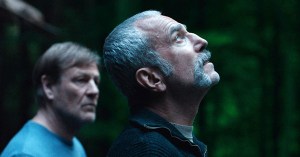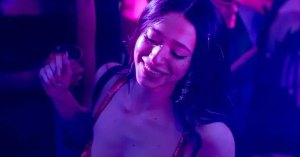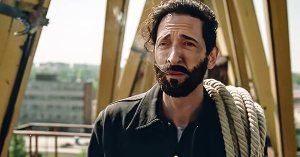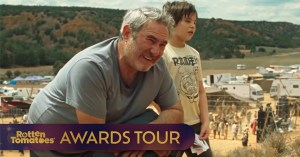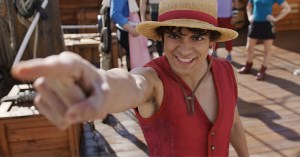RT Interview: Ben Barnes on Taking on the Journey of Prince Caspian
The titular King-in-waiting sits down to tell us about his adventures in Narnia.
Are you getting more of a sense of how big the scale of this thing is now that you’re doing the junkets? Ben Barnes: Yes. I got a real scale shock in LA last week when I saw the first billboard. It was the size of a building, and with just me on it. I mean, it’s exciting, and terrifying, and slightly freaky; it leaves you really speechless. It’s sort of awesome in the sort of traditional sense of the word “awesome,” but also really frightening. Does it feel like it’s going to be this big when you’re on set? BB: Well, we finished shooting in September, so we didn’t really get any of that sort of press stuff whilst we were shooting, and the Narnia set really does feel like a different world anyway, because you’ve got all these people with three hours of makeup, and dwarves, and giants, and you know, it just generally feels like a different planet anyway. So, to come out of that into this, which is a totally different world to me again, is very exciting. I mean, I haven’t even seen the film, so I’m just really looking forward to it like any sort of Narnia fan. Did you watch the BBC show when you were growing up? BB: Yeah, I did. I found my copy of the book again recently, and I have the book with that cover on it:”now a major BBC TV series.” I was eight when that came out, and I watched it with my dad, and loved every second of it, and thought it was magic. I watched a little bit of it again recently, and I had to switch it off because it was just ruining my memory of it. It’s just a puppet. There’s no cool CGI, it’s just a puppet. And Warwick Davis, who plays Nikabrik in this film was Reepicheep in the TV show and he was just a dwarf in a mouse costume. Like, a little nose on the end, but no attempt to even vaguely make him mouse-like. At the time, brilliant, amazing. It had that little Harry Pottery music, and it panned over the map at the beginning of it, and those loveable but irritating kids. I mean, Lucy, oh my god. I thought it was brilliant, I was a fan. So was that your first introduction to Narnia, or did you read the books? BB: I read them when I was eight, and then I watched the TV series. This was all at the same time, I think. With these films they do a lot of book campaigning, to get people to read it before you see it, I think that kind of stuff doesn’t really change. It’s always been like that though, if there’s a film coming out that’s some kind of adaptation, I’ll try and read that book quickly if I can, because I like to read it first if possible. How did you first hear about the project? BB: I didn’t know it was happening until I got called for an audition. I was doing The History Boys in the West End, and one of the casting directors saw me in that, and asked if I’d like to come in for an audition, which I duly did. Then I did a screen test, and a week later, I had the part. I mean, it was very quick from start to finish, because they were about to start making the film, and they didn’t have a Caspian, so it was great for me. Slightly worrying to leave it that late, is it not? BB: Well, they were looking for a year, they just hadn’t found the right person, so either I was the right person, or they were running so late, they were like “right, whoever walks in next, we’ll give them the part”. It was one of those two things. So from the moment you first heard about the project, to the moment you were on the set, how long was that, roughly? BB: About five weeks? Six weeks. Let’s say five or six weeks. They threw you in at the deep end, then? BB: Well, once I got onto set, I had a week or two of horses and swords, whilst they were filming some of the Pevensie stuff that’s at the beginning. Overwhelming is probably the right word. My very first shot, there’s an opening chase sequence where I get knocked off the horse and dragged along by the horse for a bit, and my opening shot was that drag. So I literally had to lie down on the floor, and some stuntmen attached a piece of rope to my leg and pulled me into frame. So I was literally dragged into the movie. How well did you get on with Andrew? BB: He’s fantastic. He has this extraordinary ability, because he comes from this sort of animation background, and he’s got this eye for pre-visualisation and detail and all that, but he’s also got the bigger picture in mind all the time. There’s a very useful talent; that he is able to focus on minute details, and also the vastness that is a Narnia story at the same time. And so it’s amazing to have someone like that on the set, who just understands every single facet of what’s going on, because everyone else is pretty confused most of the time. And they have a great AD team. That first day when I walked on set, the first AD went, “this is Ben Barnes, he’s playing Caspian, do not look him directly in the eye, do not come within five feet of him without permission, okay?” and literally for the next few days there were still a few people who were a bit wary, they thought he was serious. Do you have the time you need to spend with your director when you’re making a film as complex as this? BB: Less so on this one, because I come from a theatre background, I’m used to a month’s rehearsal, which obviously on a film you don’t get, at all. But they’re very good, it’s a very patient set, because you’ve got special effects, animals and children. So it’s a very patient family feel to the set. If you need the time, you can certainly have it. But at the same time, there’s a lot of pressure on such a big budget movie, to get every shot on time. Often, you might have to sit on the horse, and look slightly up and to the left, as opposed to, “what’s my motivation for this bit.” Sometimes you just have to do that. And it’s frustrating as an aspiring, eager actor, wanting to do everything by the book, but then you watch a couple of tiny bits back and you realise that, “actually, I should have looked up and to the left, and just shut up.” Sometimes I think there’s definitely a case for that, but at the same time when you come from theatre, from sort of through lines and motivations, there are moments when it’s frustrating, you know, when you feel you’ve done a great take, but you the horse was a little antsy during it so you have do redo it for the horse, so whatever. When you first read the book, what did you think of Prince Caspian as a character? BB: Well, obviously I had a slightly different image of him, because when you’re eight, you imagine him being around your own age. That’s how you read books like that, when you’re that age, and he also has curly blonde hair, and all this. So you imagine something slightly different, and obviously my image of it was tainted from the TV series. But Caspian is also a character that things basically just happen to, C.S. Lewis doesn’t really spend time fleshing out character. He might describe it in an adjective, like Susan the gentle, or Peter the magnificent, but Caspian doesn’t get one, so you’re blind from that point of view. He’s more of an everyman, than a proactive hero or proactive anything, really. So we had to find our way with it and we made the decision to make the Telmarines… you know, in the book it says “descended from the Pacific islands, and women and pirates”, so they made a decision to make them that swarthy European bearded race. And I’m the only young one. So obviously when they decided to make them Spanish-esque, that gives you a different sort of view on what they’re trying to achieve. And so I could draw inspiration from the actors playing the rest of my family, and playing the generals, who presumably I’ve been trained by as a young man, and all this. So I’m guessing you did get an opportunity to define who this guy was? BB: Yeah, from my point of view, absolutely. It was a new take on it, and by necessity, because the kid actors have grown up now, because William is 21, and Caspian’s the same age as Peter. We had to make a decision to make them the same age and slightly more mature, slightly older, because otherwise you’ve got 20 year olds running around, pretending to be kids, which is insane. And also because in the Dawn Treader, you’ve got more of an established man; because they were intending to shoot them back to back, it was more sensible to have a 26 year old playing younger, than a 15 year old trying to play a king. It would be farcical in this day and age, and I think with all these stories, you have to make them more accessible and more contemporary for the audience it’s aimed at, and also audiences who have enjoyed the first one have grown up slightly too, to I think it’s a valid change. But it was all those things I was telling you about earlier; his ambivalence about being a leader, his concern about whether vengeance is the best policy, his discovery that he has to turn in his own family because they’ve murdered his own father, those are the things that are really interesting about Caspian to me. And I’m sure those weren’t the things that were interesting to me about Caspian when I was a kid. I’m sure when I was eight, the thing that was cool was the fact that he was a kid who had a sword, and a horse. Are you hoping to carry on and make the next film? Are you signed on for that? BB: I am, I’m signed on for the Dawn Treader, we start at the end of the year, in November I think. That’s quite a quick turnaround after the release. BB: Well it was going to start straight away, but then we had problems with the strike, and exam schedules for children, and little things like that, so we’re taking our time with it, which I think is probably sensible. The first one was great, and this one’s going to be even better, no doubt. You have to take the time to make the next one better. And presumably at least it’ll give you a chance to rest after what’ll be some incredibly intensive international press and PR. BB: Well you know, I’m 26, who wants to rest? I want to make films, so we’ll have to see what’s on the horizon.





